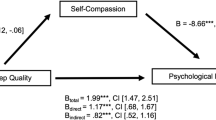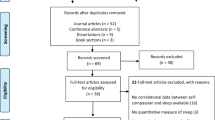Abstract
Two studies were designed to examine the role of self-compassion on sleep quality. One hundred and forty-two participants completed a one-time survey in which they reported their trait level self-compassion, sleep quality assessment and perceived stress over last month. Mediation analysis using regression and bootstrapping indicated that self-compassion was positively related to sleep quality assessment, and this relationship was mediated by perceived stress. Higher levels of self-compassion were associated with lower levels of perceived stress, and the latter were linked to better sleep. A 2-week diary study with a subsample of fifty-nine participants was followed to examine the effect of self-compassion on sleep outcomes within and between individual on a daily basis. Participants rated their stressor of the day before bed and sleep quality upon awakening. Multilevel models supported the positive effect of self-compassion on everyday sleep outcomes. Specifically, self-compassion buffered the negative effect of daily stressor on sleep latency. Experiencing stressful events during the day were associated with taking a longer time to fall asleep at night, except for participants with higher levels of self-compassion. Higher levels of self-compassion were also indirectly associated with a better mood and more alertness upon awakening. Self-compassion could benefit sleep quality both through the buffering effect and the indirect effect.



Similar content being viewed by others
References
Allen, A. B., & Leary, M. R. (2010). Self-compassion, stress, and coping. Social and Personality Psychology Compass, 4(2), 107–118.
American Psychiatric Association. (2013). Diagnostic and Statistical Manual of Mental Disorders: DSM-5. Washington, D.C: American Psychiatric Association.
Arch, J. J., Brown, K. W., Dean, D. J., Landy, L. N., Brown, K. D., & Laudenslager, M. L. (2014). Self-compassion training modulates alpha-amylase, heart rate variability, and subjective responses to social evaluative threat in women. Psychoneuroendocrinology, 42, 49–58.
Baker, F. C., Maloney, S., & Driver, H. S. (1999). A comparison of subjective estimates of sleep with objective polysomnographic data in healthy men and women. Journal of Psychosomatic Research, 47(4), 335–341.
Baron, R. M., & Kenny, D. A. (1986). The moderator-mediator variable distinction in social psychological research: conceptual, strategic, and statistical considerations. Journal of Personality and Social Psychology, 51, 1173–1182.
Bates, D., Maechler, M., Bolker, B., & Walker, S. (2015). Fitting linear mixed-effects models using lme4. Journal of Statistical Software, 67(1), 1–48.
Blake, M., Waloszek, J. M., Schwartz, R., Murray, G., Dahl, R. E., Bootzin, R., et al. (2016). The SENSE study: post intervention effects of a randomized controlled trial of a cognitive-behavioral and mindfulness-based group sleep improvement intervention among at-risk adolescents. Journal of Consulting and Clinical Psychology, 84(12), 1039–1051.
Bluth, K., Gaylord, S. A., Campo, R. A., Mullarkey, M. C., & Hobbs, L. (2016). Making friends with yourself: a mixed methods pilot study of a mindful self-compassion programs for adolescents. Mindfulness, 7, 479–492.
Breines, J. G., Thoma, M. V., Gianferante, D., Hanlin, L., Chen, X., & Rohleder, N. (2014). Self-compassion as a predictor of interleukin-6 response to acute psychosocial stress. Brain, Behavior, and Immunity, 37, 109–114.
Brion, J. M., Leary, M. R., & Drabkin, A. S. (2014). Self-compassion and reactions to serious illness:the case of HIV. Journal of Health Psychology, 19(2), 218–229.
Buysse, D. J., Reynolds III, C. F., Monk, T. H., Berman, S. R., & Kupfer, D. J. (1989). The Pittsburgh Sleep Quality Index: a new instrument for psychiatric practice and research. Journal of Psychiatric Research, 28(2), 193–213.
Carlson, L. E., & Garland, S. N. (2005). Impact of mindfulness-based stress reduction (MBSR) on sleep, mood, stress, and fatigue symptoms in cancer outpatients. International Journal of Behavioural Medicine, 12(4), 278–285.
Cohen, S., Kamarck, T., & Mermelstein, R. (1983). A global measure of perceived stress. Journal of Health and Social Behavior, 24(4), 385–396.
Garland, S. N., Campbell, T., Samuels, C., & Carlson, L. E. (2013). Dispositional mindfulness, insomnia, sleep quality and dysfunctional sleep beliefs in post-treatment cancer patients. Personality and Individual Differences, 55(3), 306–311.
Hall, C. W., Row, K. A., Wuensch, K. L., & Godley, K. R. (2013). The role of self-compassion in physical and psychological well-being. The Journal of Psychology, 147(4), 311–323.
Hubbling, A., Reilly-Spong, M., Kreitzer, M. J., & Gross, C. R. (2014). How mindfulness changed my sleep: focus groups with chronic insomnia patients. BMC Complementary and Alternative Medicine, 14(1), 50.
Howell, A. J., Digdon, N. L., & Buro, K. (2010). Mindfulness predicts sleep-related self-regulation and well-being. Personality and Individual Differences, 48(4), 419–424.
Howell, A. J., Digdon, N. L., Buro, K., & Sheptycki, A. R. (2008). Relations among mindfulness, well-being, and sleep. Personality and Individual Differences, 45(8), 773–777.
Jackowska, M., Dockray, S., Hendrickx, H., & Steptoe, A. (2011). Psychosocial factors and sleep efficiency: discrepancies between subjective and objective evaluations of sleep. Psychosomatic Medicine, 73(9), 810–816.
Kelly, A. C., Zuroff, D. C., Foa, C. L., & Gilbert, P. (2010). Who benefits from training in self-compassionate self-regulation? A study of smoking reduction. Journal of Social and Clinical Psychology, 29(7), 727–755.
Kemper, K. J., Mo, X., & Khayat, R. (2015). Are mindfulness and self-compassion associated with sleep and resilience in health professionals? The Journal of Alternative and Complementary Medicine, 21(8), 496–503.
Leary, M. R., Tate, E. B., Adams, C. E., Batts Allen, A., & Hancock, J. (2007). Self-compassion and reactions to unpleasant self-relevant events: the implications of treating oneself kindly. Journal of Personality and Social Psychology, 92(5), 887–904.
Luyster, F. S., Strollo, P. J., Zee, P. C., & Walsh, J. K. (2012). Sleep: a health imperative. Sleep, 35(6), 727–734.
Marques, M., Pereira, A. T., Freitas, V., Bento, E., Azevedo, J., Xavier, S., et al. (2016). Self-compassion and insomnia at pregnancy. European Psychiatry, 33, S268–S268.
Morin, C. M. (1993). Insomnia: Psychological Assessment and Management. New York: The Guilford Press.
Morin, C. M., Rodrigue, S., & Ivers, H. (2003). Role of stress, arousal, and coping skills in primary insomnia. Psychosomatic Medicine, 65, 259–267.
Neff, K. D. (2003a). Self-compassion: an alternative conceptualization of a healthy attitude toward oneself. Self and Identity, 2(2), 85–101.
Neff, K. D. (2003b). The development and validation of a scale to measure self-compassion. Self and Identity, 2(3), 223–250.
Neff, K. D., & Germer, C. K. (2013). A pilot study and randomized controlled trial of the mindful self-compassion program. Journal of Clinical Psychology, 69(1), 28–44.
Neff, K. D., Kirkpatrick, K. L., & Rude, S. S. (2007). Self-compassion and adaptive psychological functioning. Journal of Research in Personality, 41(1), 139–154.
Neff, K. D., Pisitsungkagarn, K., & Hsieh, Y. P. (2008). Self-compassion and self-construal in the United States, Thailand, and Taiwan. Journal of Cross-Cultural Psychology, 39(3), 267–285.
Ong, J. C., Ulmer, C. S., & Manber, R. (2012). Improving sleep with mindfulness and acceptance: a metacognitive model of insomnia. Behaviour Research and Therapy, 50(11), 651–660.
R Core Team. (2017). R: a language and environment for statistical computing. In R Foundation for Statistical Computing, Vienna, Austria URL https://www.R-project.org/.
Preacher, K. J., & Hayes, A. F. (2008). Asymptotic and resampling strategies for assessing and comparing indirect effects in multiple mediator models. Behavior Research Methods, 40(3), 879–891.
Raes, F., Pommier, E., Neff, K. D., & Van Gucht, D. (2011). Construction and factorial validation of a short form of the self-compassion scale. Clinical Psychology & Psychotherapy, 18(3), 250–255.
Sirois, F. M. (2015). A self-regulation resource model of self-compassion and health behavior intentions in emerging adults. Preventive Medicine Reports, 2, 218–222.
Sirois, F. M., Kitner, R., & Hirsch, J. K. (2015a). Self-compassion, affect, and health-promoting behaviors. Health Psychology, 34(6), 661–669.
Sirois, F. M., Molnar, D. S., & Hirsch, J. K. (2015b). Self-compassion, stress, and coping in the context of chronic illness. Self and Identity, 14(3), 334–347.
Steptoe, A., Kunz-Ebrecht, S., Owen, N., Feldman, P. J., Willemsen, G., Kirschbaum, C., & Marmot, M. (2003). Socioeconomic status and stress-related biological responses over the working day. Psychosomatic Medicine, 65(3), 461–470.
Steptoe, A., O'Donnell, K., Marmot, M., & Wardle, J. (2008). Positive affect, psychological well-being, and good sleep. Journal of Psychosomatic Research, 64(4), 409–415.
Teixeira, I., Simões, S., Marques, M., Espírito-Santo, H., & Lemos, L. (2016). Self-criticism and self-compassion role in the occurrence of insomnia on college students. European Psychiatry, 33, S268–S268.
Terry, M. L., Leary, M. R., Mehta, S., & Henderson, K. (2013). Self-compassionate reactions to health threats. Personality and Social Psychology Bulletin, 39(7), 911–926.
Wong, C. C., & Mak, W. W. (2013). Differentiating the role of three self-compassion components in buffering cognitive-personality vulnerability to depression among Chinese in Hong Kong. Journal of Counseling Psychology, 60(1), 162–169.
Acknowledgements
We thank all the participants who participated in the study.
Funding
This work was funded by the MOE (Ministry of Education) Project of Humanities and Social Science (16YJCZH107) and the National Natural Science Foundation of China (31700961).
Author information
Authors and Affiliations
Contributions
YH: designed and executed the study, conducted data analyses, and wrote the paper. YW: designed and executed the study and wrote the paper. YS: collaborated with data collection. JA and SP: collaborated with data collection and the editing of the final manuscript.
Corresponding author
Ethics declarations
Ethical Approval
All procedures performed in studies involving human participants were in accordance with the ethical standards of Texas State University Human Institutional Review Board and the Department of Psychology of Sun Yat-sen University Human Subject Review Boards, as well as with the 1964 Helsinki declaration and its later amendments or comparable ethical standards.
Informed Consent
Informed consent was obtained from all individual participants included in this study.
Conflict of Interest
The authors declare that they have no conflict of interest.
Rights and permissions
About this article
Cite this article
Hu, Y., Wang, Y., Sun, Y. et al. Diary Study: the Protective Role of Self-Compassion on Stress-Related Poor Sleep Quality. Mindfulness 9, 1931–1940 (2018). https://doi.org/10.1007/s12671-018-0939-7
Published:
Issue Date:
DOI: https://doi.org/10.1007/s12671-018-0939-7




